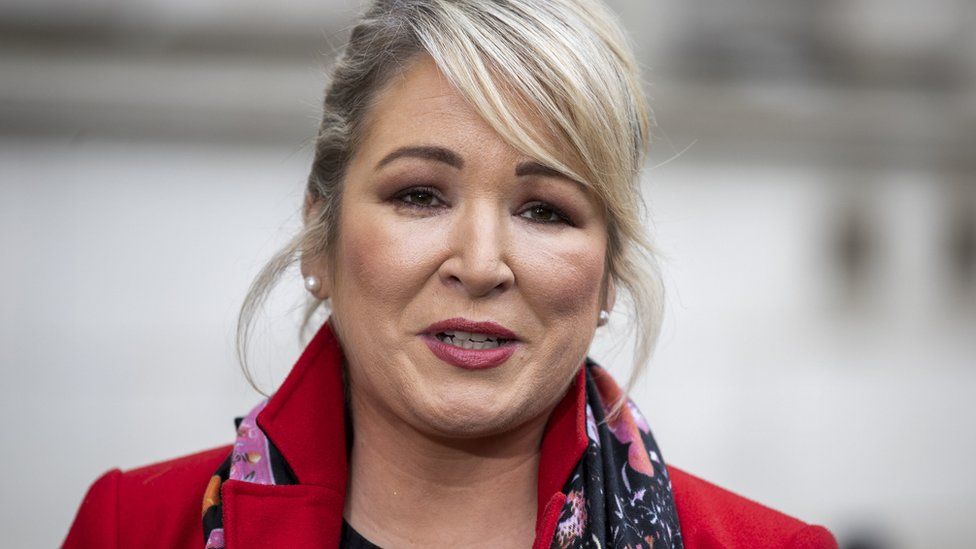ARTICLE AD BOX
 Image source, PA Media
Image source, PA Media
Ms O'Neill became deputy first minister in the months before the pandemic
Former deputy first minister Michelle O'Neill has said there were "ad-hoc and tick-box" meetings between Stormont ministers and the UK government during the pandemic.
Ms O'Neill gave evidence to the UK Covid-19 inquiry on Wednesday.
The inquiry is focusing on Northern Ireland this week and its preparedness in the run-up to the pandemic.
Ms O'Neill said there was not an "easy flow of information".
She was being asked about the nature of communication between Stormont ministers and London.
"I found that meetings were called at short notice, documentation wasn't shared in advance and that would have been at the detriment of planning for the [health] minister," she said.
Ms O'Neill added meetings that did take place were to "hand down" decisions that had already been taken by the UK government.
"On many occasions they were what I would describe as ad-hoc and tick-box meetings."
Austerity 'detrimental' to services
Earlier, the Sinn Féin deputy leader told the inquiry there was a distinct lack of resources to run the health and care system during her time as minister for health.
Ms O'Neill said health departments "found it very difficult to manage within the resource that they had particularly as a direct result of austerity".
She added austerity had been detrimental to all public services and it undermined the health department's ability to be resilient when faced with a pandemic.
Image source, UK Covid-19 Inquiry/PA
Image caption,Ms O'Neill said her priority as health minister was transforming the delivery of health services in Northern Ireland
Ms O'Neill said the first time she was briefed on the risk of an influenza pandemic was in October 2016, several months after she became health minister.
She was asked if she was made aware of emergency civil contingency plans in the event of a pandemic to which Ms O'Neill responded that her priority during her tenure as health minister was transforming the delivery of health services in Northern Ireland.
She agreed it would have been better if she had been briefed on the risks facing her department when she took over as minister.
Lack of political leadership
On Monday, Northern Ireland's Chief Medical Officer Sir Michael McBride told the inquiry there was "no doubt" the absence of ministers had a significant impact on Stormont's preparedness for a pandemic.
Ms O'Neill accepted that the absence of political leadership had made a significant difference.
She further explained that she regretted "there wasn't the political leadership to carry on the work which (she) had started on transforming the health and social care system."
The Sinn Féin vice president took up the position of deputy first minister two months before the pandemic hit in March 2020.
Northern Ireland's devolved government did not function from January 2017 to January 2020.
Health officials have argued this affected Northern Ireland's preparedness for health emergencies.
The inquiry is focusing on Northern Ireland this week and its preparedness in the run-up to the pandemic.
Land border impact
The chief executive of the Public Health Agency (PHA) also gave evidence at Wednesday's hearing.
Aiden Dawson told the inquiry that he had concerns that the current emergency planning team was not big enough to take on all the roles the PHA needed in the future.
He said he would like a bigger emergency planning team but the organisation was currently undergoing a review to look at how it was formed, set up and the function it provides. Emergency planning will come under that.
Mr Dawson added that, in hindsight, he believed that the PHA should have employed a consultant epidemiologist and had the ability to have Northern Ireland specific modelling capabilities.
"One of the varying factors we have, which is not seen in the rest of the UK, is that we have an open land border with the Republic of Ireland, which may have had a variation impact on disease progression within Northern Ireland and therefore the ability to monitor and have real time modelling in NI was important," he said.
'Gap in resilience'
Due to the system of government in Northern Ireland, Michelle O'Neill held equal powers to the first minister at the time of the pandemic, Arlene Foster.
She said the UK government should have stepped in to make decisions in the absence of ministers at Stormont between January 2017 to January 2020.
"If there is a gap in resilience in part of the UK, surely that should concern the government of the UK," she added.
Image source, Belinda Jiao/PA
Image caption,Baroness Foster told the inquiry on Tuesday the UK government should have stepped in to make decisions in the absence of ministers at Stormont
Last week, Robin Swann, who served as health minister during the pandemic, told the inquiry a lack of reform and investment in the health service hindered its response..
At a press conference in May 2020, Ms O'Neill and Baroness Foster told Sky News they had been brought closer together by the pandemic.
However, Ms O'Neill was widely criticised the following month when she attended the funeral of senior republican Bobby Storey with hundreds of other mourners.
Regulations at the time stated a maximum of 30 people were permitted to gather together outdoors.
She insisted she worked within the guidelines but later acknowledged Stormont's public health messaging was "undermined" by the controversy.

 1 year ago
35
1 year ago
35








 English (US) ·
English (US) ·